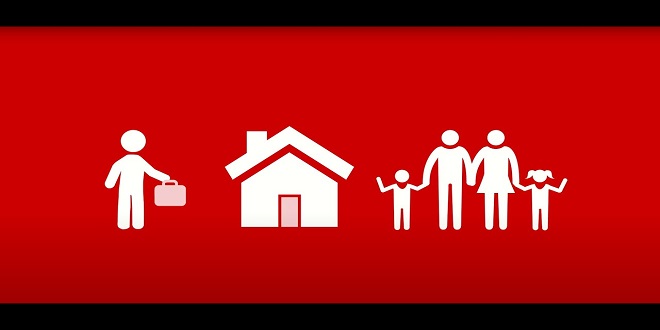Income Protection vs. Life Insurance – Which one is best for you?

You could consider income protection and life insurance two sides of one coin. One that can provide financial support for you and your family while you are alive and one that will help your family after your death.
This coin could also represent your career. One side may be successful, while the other could be struggling to get to the top. But, life is unpredictable and things do happen. How will you provide for your family and yourself if something happens?
It doesn’t matter if you flip the coin or leave it up for chance. You can choose which product works best for your needs. One product may be more appropriate for your needs than another, but both will provide you with complete protection. Continue reading to learn about the differences between income protection and life insurance, and which product is right for you.
What’s life insurance?
Life insurance provides cash lump sums to your beneficiaries or loved ones after you die. You can select a pay out sum that your family would receive. In return, you will need to pay a monthly premium or instalment for policy protection.
Life insurance is often taken out by people to protect their loved ones’ financial future. Cover can be used to pay off the mortgage, cover funeral expenses, or help family members transition to a new life without them by covering their daily costs.
The two main life insurance products are whole of life insurance (life insurance) and term-based insurance.
Term-based life insurance covers you for a set period, usually up to 40 years. You can choose to have a fixed sum (level term insurance) or decrease over time (decreasing life insurance).
Your beneficiaries and family members will receive the payout if you die during the policy term. A claim cannot be made if you die after the term. Whole of life insurance is also known as life assurance. It lasts until the policy holder passes away, regardless of when it happens. Premiums are much higher because of the guarantee nature of this product.
You can also purchase life assurance in the form over 50s insurance, also known as guaranteed over 50s plans. These policies provide lifelong coverage and guaranteed payouts (similar to whole of life insurance), but they are only available for UK residents between 50 and 85.
This policy is different from other policies because it does not require medical information. Acceptance for this age bracket is therefore guaranteed. The downside is that the maximum amount that can be assured is significantly lower than other life insurance products. Unless otherwise stated by the provider, all premiums for life insurance are fixed for the term of the policy.
What is income protection?
Income protection can replace your monthly income in the event you are unable to work because of illness or injury. To help your family pay key expenses and allow you to recuperate or rehabilitate, you could be eligible for up to 70% of your normal earnings.
Income protection serves the primary purpose of protecting your income and keeping you from falling into unmanageable debt. You pay a monthly installment to be able to resemble your monthly salary. This will allow you to continue paying your rent or mortgage payments and other essential bills until you are able to work again.
Income protection is not like life insurance in that the payouts won’t happen immediately. A deferred period is what income protection policies are known as.
The deferred time is the period during which you are not allowed to work due to your injury or illness. The deferred period can be anywhere from 4 to 52 week, and many people choose to combine this with their savings or sick pay benefits. When it comes to settling a claim, an income protection policy might have different definitions.
If you are unable to perform your job, you can claim for your occupation.
If you are unable to work, you can file a claim under a policy that includes a definition of occupation impairment.
If you are unable to do your job due to illness or injury, then you can file a suitability claim for a job that uses your skills and experience.
What’s not covered by both income protection or life insurance?
It is always a good idea to read the terms and conditions for any product that you are interested in. Both policies will typically have a list of items that aren’t covered.
You can’t make a claim for income protection or life insurance if you stop paying your premiums. Any self-inflicted injury, illness, or death that results in injury, illness, or death will not be covered.
Due to possible health problems, misuse of alcohol or drug addiction could result in your policy being terminated. Incorrectly filling out the application form, such as missing important medical information, can lead to “non disclosure” that could lead to future claims being denied and policy termination.
Income protection does not cover death, but it covers injury and illness. Life insurance doesn’t cover illness or terminal illness unless there is a special critical or terminal illness clause.
There are some situations that will not be covered by both income protection insurance and life insurance. It is important to read the policy terms and conditions.
Unless you have critical illness coverage or terminal illness coverage, your life insurance policy will not cover injury or illness. These are extra forms of coverage that will allow you to claim your policy early if you have a life-threatening illness or a life-changing condition.
Income protection, however, won’t pay for death. Income protection policies won’t pay out for death, unemployment, or illnesses caused by drug or alcohol abuse.
If premium payments are not made or if there is a ‘non disclosure’, both an income protection policy and a life insurance policy become invalid. This is when you withhold or provide false information in a life insurance application.
Pre-existing conditions may be considered exclusions for both income protection and life insurance policies. This means that they will not be covered.
How are premiums calculated for income protection and life insurance?
Insurers consider many factors when calculating the premiums for a policy.
You will need to provide important information when applying for life and income insurance.
Age
Smoking status
Wellbeing and health
BMI (body mass index)
Occupation
Medical history
Lifestyle
The price you pay will also be determined by policy factors. This includes:
Policy term
Payout period length (long-term or short-term)
Deferred period
Definition of incapacity
Premium type
For life insurance, this includes:
Policy term
Sum assured
Type of policy (term or whole-of-life)
Although the basic information is the same for income protection and life insurance policies, there are many policy factors that will impact the price you pay.
The key difference between income protection and life insurance is that premiums for income protection are not always guaranteed. The policy you choose will determine whether premiums are guaranteed (which remain fixed), age-banded, or reviewable. These can be subject to change depending on certain criteria.
Which policy option is the best?
It will all come down to your individual circumstances and what you are most concerned about. Life insurance may be a better choice for those who wish to pay for their funerals or provide support for their family after they pass. Income protection is a good option if you aren’t able to receive traditional sick pay benefits or are self-employed.
You could buy both products concurrently if you have the funds. It all boils down to your personal and family situation and your budget.
You might already know which product is best for you. If you aren’t sure if a policy is right or within your budget, you might consider speaking to a broker like Reassured Advice. You could also use a trusted comparison website to find multiple quotes.


